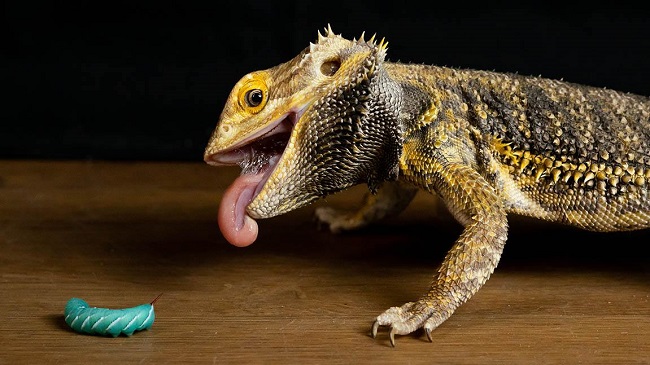Bearded dragons, popular pets with their docile nature and captivating looks, require a diverse diet for optimal health.
Hornworms can potentially form a part of this diet, but is it safe for bearded dragons to eat them? This article will explore the benefits and considerations of feeding hornworms to bearded dragons.

Hornworms: Nutritious Feeders for Bearded Dragons
Hornworms, the larval stage of the hawk moth, are soft-bodied, brightly colored insects that are often used as feeders in the exotic pet industry.
Read Also:
Nutritional Profile
Hornworms are known for their high moisture content, which makes them a fantastic source of hydration for bearded dragons. They also contain moderate levels of protein and low fat, making them a healthier choice compared to some other feeder insects.
Can Bearded Dragons Eat Hornworms?
The simple answer is yes, bearded dragons can eat hornworms. However, like all aspects of pet care, there are some critical considerations to keep in mind.
The Benefits
Aside from hydration, hornworms can add variety to your bearded dragon’s diet and stimulate their hunting instincts. They are also soft and easy to digest.
The Cautions
Hornworms grow very rapidly and can reach a large size that might be difficult for smaller bearded dragons to consume. It’s important to feed hornworms that are an appropriate size – generally, no larger than the space between your bearded dragon’s eyes.
Feeding Guidelines: Hornworms for Bearded Dragons
As with any feeder insect, there are best practices for feeding hornworms to your bearded dragon.
Frequency and Quantity
Due to their high moisture content, hornworms should be offered as a treat rather than a staple diet. Overfeeding can lead to diarrhea. As a general rule, one or two hornworms per week should suffice.
Preparation
Hornworms should be fed live to stimulate the bearded dragon’s hunting instincts. They can be placed directly in your bearded dragon’s enclosure using feeding tongs.
Purchasing and Storing Hornworms
Hornworms are available from many pet stores and online retailers. They should be stored in a cool place, but not refrigerated, and can be kept in the container they come in, which usually includes food for the worms.
Impact on Bearded Dragon’s Health
While hornworms are generally safe for bearded dragons, like any food item, they have potential implications for your pet’s health.
Hydration
Due to their high water content, hornworms are an excellent way to boost your bearded dragon’s hydration levels. This can be particularly beneficial in hot weather or if your dragon is prone to dehydration.
Risk of Overfeeding
While hornworms are nutritious, they are also quite rich. Overfeeding these worms can lead to weight gain and other health problems. Always feed hornworms in moderation.
Variety in Diet
Although bearded dragons can eat hornworms, remember that these should only form a small part of a varied diet.
Staple Foods
Staple foods for bearded dragons include insects like crickets, dubia roaches, and certain types of worms, as well as a selection of vegetables and occasional fruits.
Treat Foods
Hornworms, along with other food items such as mealworms, waxworms, and certain fruits, should be considered treat foods and given sparingly.
Safe Handling of Hornworms
When feeding hornworms to your bearded dragon, you need to ensure they are safe for consumption.
Sourcing
Always source your hornworms from reputable breeders or pet stores to avoid the risk of parasites or diseases. Never feed wild-caught insects to your bearded dragon.
Handling
Handle hornworms with care. Use feeding tongs to avoid the hornworm’s mouth and the small horn on its rear end, which can pinch.
Read Also:
Conclusion
In conclusion, hornworms can be a nutritious and exciting addition to your bearded dragon’s diet when fed appropriately.
They provide hydration and protein while stimulating your pet’s natural hunting behavior. Always remember to provide a varied diet to your bearded dragon for optimal health and longevity.
























